Thinking of optimizing your law firm’s website for search engines? There are certain things that you should be aware of. In this chapter, we’ll address all the common questions about SEO for lawyers that our clients and prospects ask us repeatedly.
Let’s dive in.
How Does Legal SEO Work: What is an SEO Strategy for a Law Firm?
Legal SEO involves optimizing your law firm’s online presence to improve search engine rankings and drive more website traffic to law firm websites. To develop the SEO strategy for your law firm, you need to focus on several key areas of search engine optimization.
Local SEO
Local SEO for lawyers focuses on optimizing your law firm’s Google My Business account, targeting location-specific keywords (such as “near me” searches), and garnering positive reviews to improve local search visibility.

Off-Page SEO
In this case, you implement tactics outside your website, such as building backlinks and enhancing social media engagement, to improve search rankings.
On-Page SEO
This involves optimizing web page content through targeted keywords, informative blogs, and improved user experience, just like this law firm has done in the image below.

Technical SEO
When you optimize your website structure and URLs and implement tags and schema markup, technical SEO helps search engines crawl and index the website effectively.
Why is Local SEO Important for Law Firms?
It’s important for law firms because it serves as a lead-generation strategy.
With local SEO, you can outrank the local competition, improve click-through rates, and generate more phone calls through Google My Business. Plus, it drives traffic through localized content and enhances online reputation with positive client reviews.
What Are The Top Benefits of Using SEO for Your Legal Website?
The legal industry is highly competitive. To win more business, you must appear in the top search results when someone looks for a lawyer. Search Engine Optimization helps you do that without a heavy investment.
With consistent SEO efforts, you can outrank your competitors, improve your CTR, and generate more leads to your website.
What Type of Keywords are Most Suitable for Legal SEO?
You must conduct keyword research to rank in search engines for the terms your prospective clients seek. The best suitable keywords are:
- Practice area-specific terms like “personal injury lawyer” or “divorce attorney.”
- Location-based keywords like “Los Angeles immigration lawyer” to target local clients.
- Long-tail keywords such as “best intellectual property attorney in Chicago” as they align with someone who might be interested in your legal services.
How Long Does It Take to Rank a Law Firm Website on the First Page of Google?
As per a study by Ahrefs, it can take 2-6 months to rank on the first page of Google.

John Mueller from Google explained that it takes almost a similar amount of time to rerank an old website.
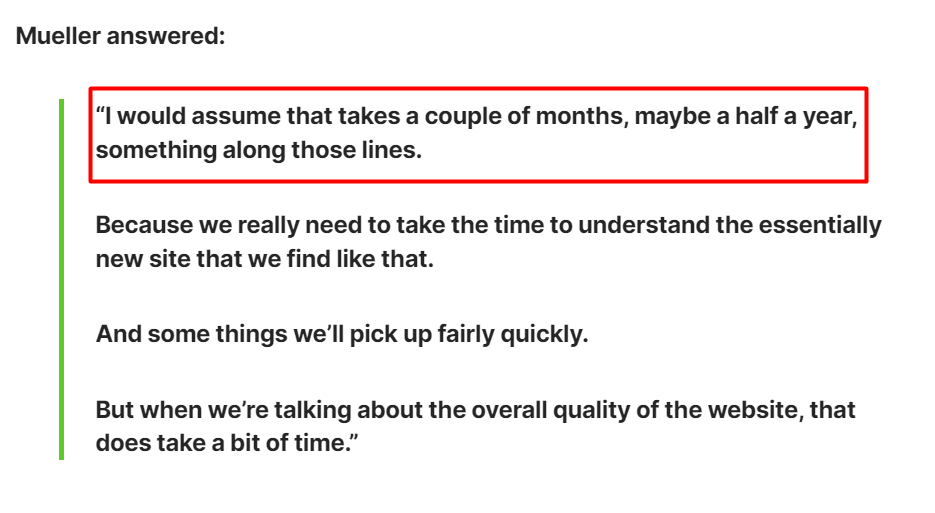
Some reasons why it takes so much time to rank on Google are time-taking website crawling and indexing, optimization efforts, competition, and user experience, but the major reason is backlinks. Semrush did a research, where they found the domains that never reached the top ranking were the ones that had no backlink data.
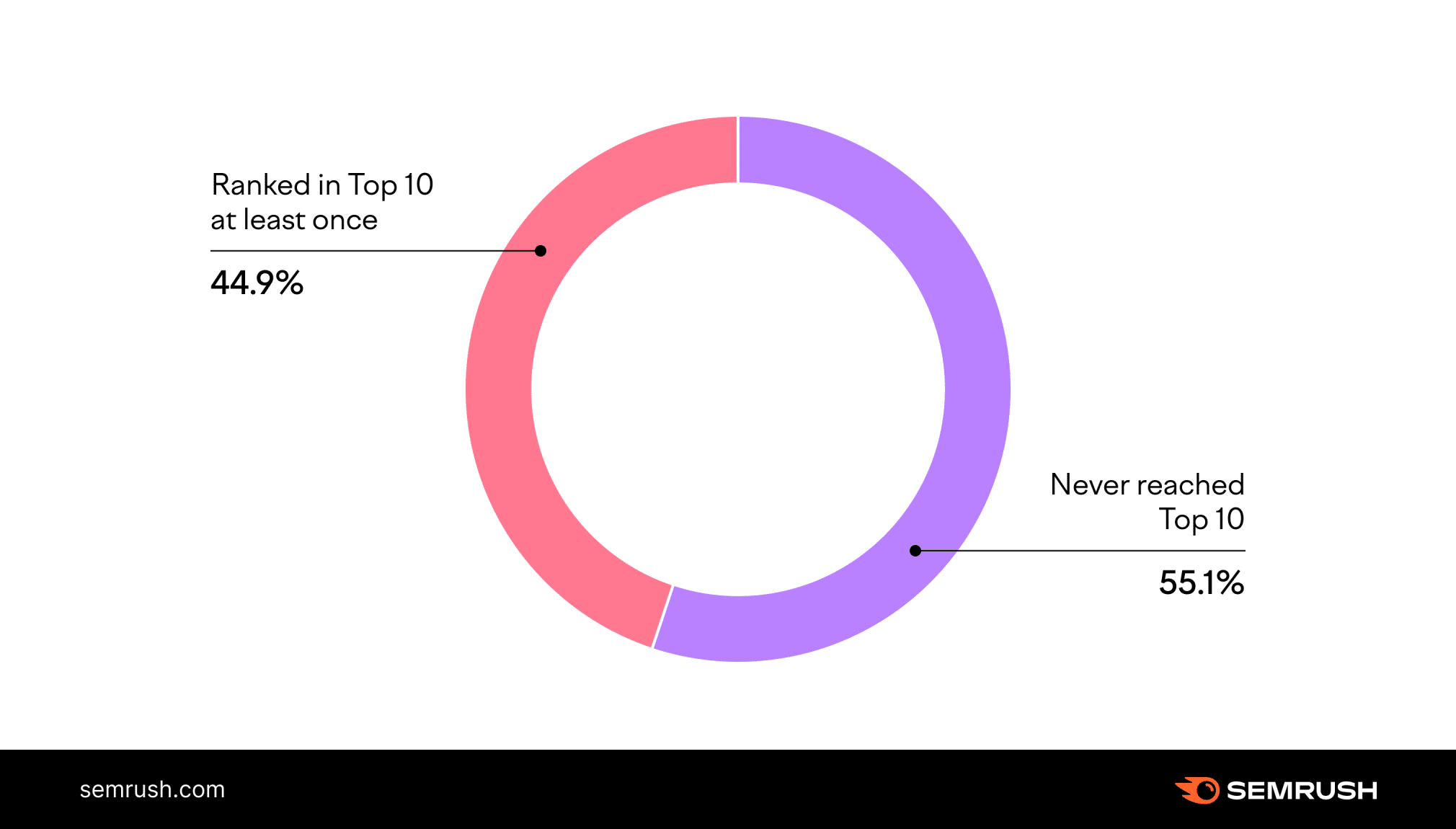
It takes time to build quality backlinks and then Google has to index them, which may take anywhere from 3-12 months before you can see any results.
Yet, it’s possible to speed up this whole process. Consider focusing on providing the best user experience, creating quality content (including news, legal updates, analysis of hot issues, or your opinions on trending topics), and running a link-gap analysis (Identifying broken links and suggesting relevant link replacements from your blog).
Delving deep into this topic is beyond the scope of this article, so you can read this detailed explanation of how long it takes a website to rank at the top of search engine results. It also shared advice on how you can make the process faster.
What Types of Backlinks Help in Improving Law Firm SEO?
The high-quality backlinks are the ones you obtain from reputable and contextually relevant legal sources. For instance, authoritative legal websites, industry directories, and reputable publications.
While some backlinks from reputable sources can aid your SEO, obtaining excessive random backlinks from .edu or .gov domains is a black-hat tactic that might lead to Google penalties.
What is the Relationship between PPC Campaigns and SEO?
SEO boosts search engine rankings and organic website traffic for sustained lead generation. PPC ads provide instant visibility based on targeted keywords. However, a well-executed PPC campaign can complement law firm SEO and drive more targeted traffic to your website and enhance your brand exposure.
How Essential is Blogging For SEO in the Legal Industry?
All Law is a legal directory that receives over 400 visitors every month from a single post they once wrote.
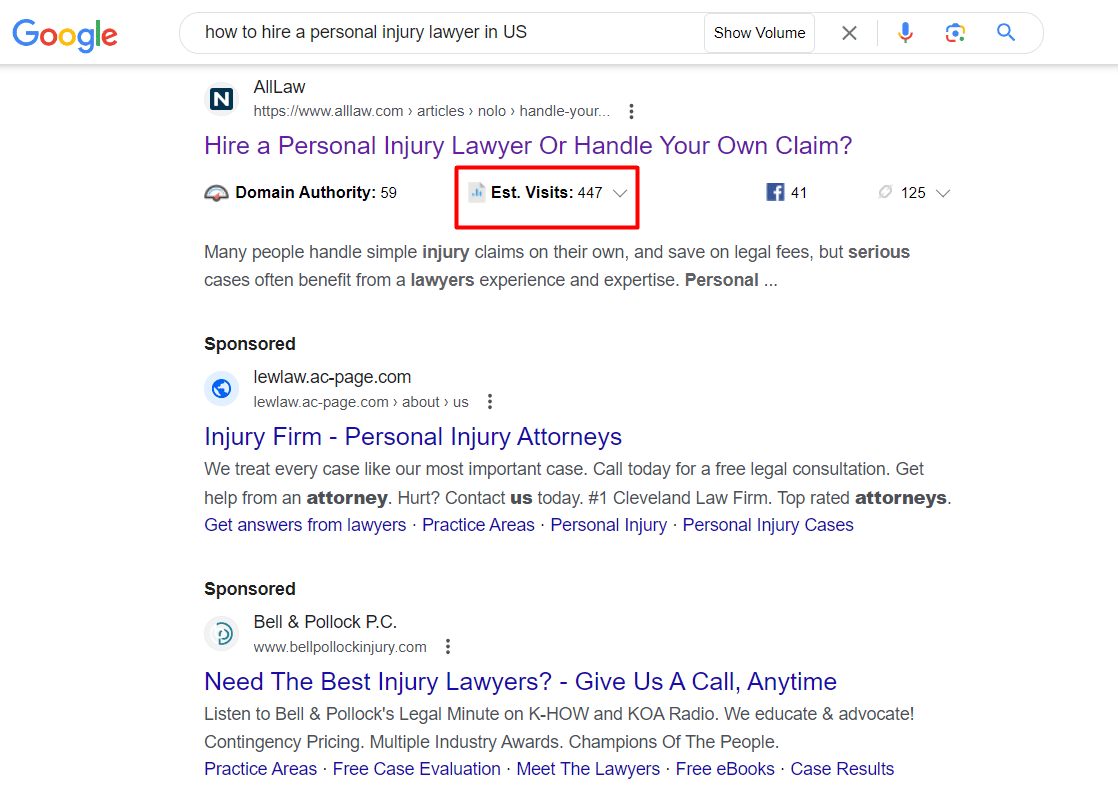
In fact, the majority of traffic and backlinks they receive comes from their blogs and articles.

Plus, it’s no news that legal industry is a complex field that runs on trust. Creating high-quality SEO content, which is also a ranking factor, can establish you as an expert in your niche and build trust.
Along with that, blogging can improve your click-through rate, optimize your index coverage, and help you get quality backlinks.
Can You Blog “Too Much?” What’s the Right Lawyer Blogging Frequency?
There’s no fixed rule on how often you should blog, but posting 2-4 times per week (11-16 posts monthly) to build readership and gain traction based on your niche.
Still, quality content surpasses quantity. Plus, per 2023 SEO statistics, regularly creating long-form content is also a good way to generate high-quality backlinks. So, instead of blogging daily with generic posts, create long-form quality content.

What Are the Limitations of SEO for Law Firms?
A big limitation of law firm SEO is the dynamic nature of search algorithms. To stay at the top of search results, you must constantly stay informed about the algorithm’s updates to make necessary adjustments. Google announces its updates in Google Search Central.

Additionally, intense competition poses another obstacle, as even with proper strategies, someone else may still outrank your law firm despite your SEO efforts to rank high on Google.
It can be due to their stronger online presence, better optimization, or more authoritative backlinks. For instance, you might be doing everything right, yet, a top legal directory like FindLaw or Super Lawyers may outrank you.
But there’s still hope.
A few years ago, Brian Dean came up with a skyscraper technique to tackle this issue. He explained the key to increasing your website traffic is to identify what your competitors are covering in their content, and then make it much better.
So, what you can do is conduct a competitor analysis, create more impressive SEO content, and reach out to the right people for backlinks.
What Are the Common Factors That Can Impact My SEO Campaign and Rankings?
There has been a long-standing 200 ranking factor myth that has misled many marketers. But as per Google, the common factors that can impact your ranking and SEO campaign are high-quality content, authoritative backlinks, and RankBrain.
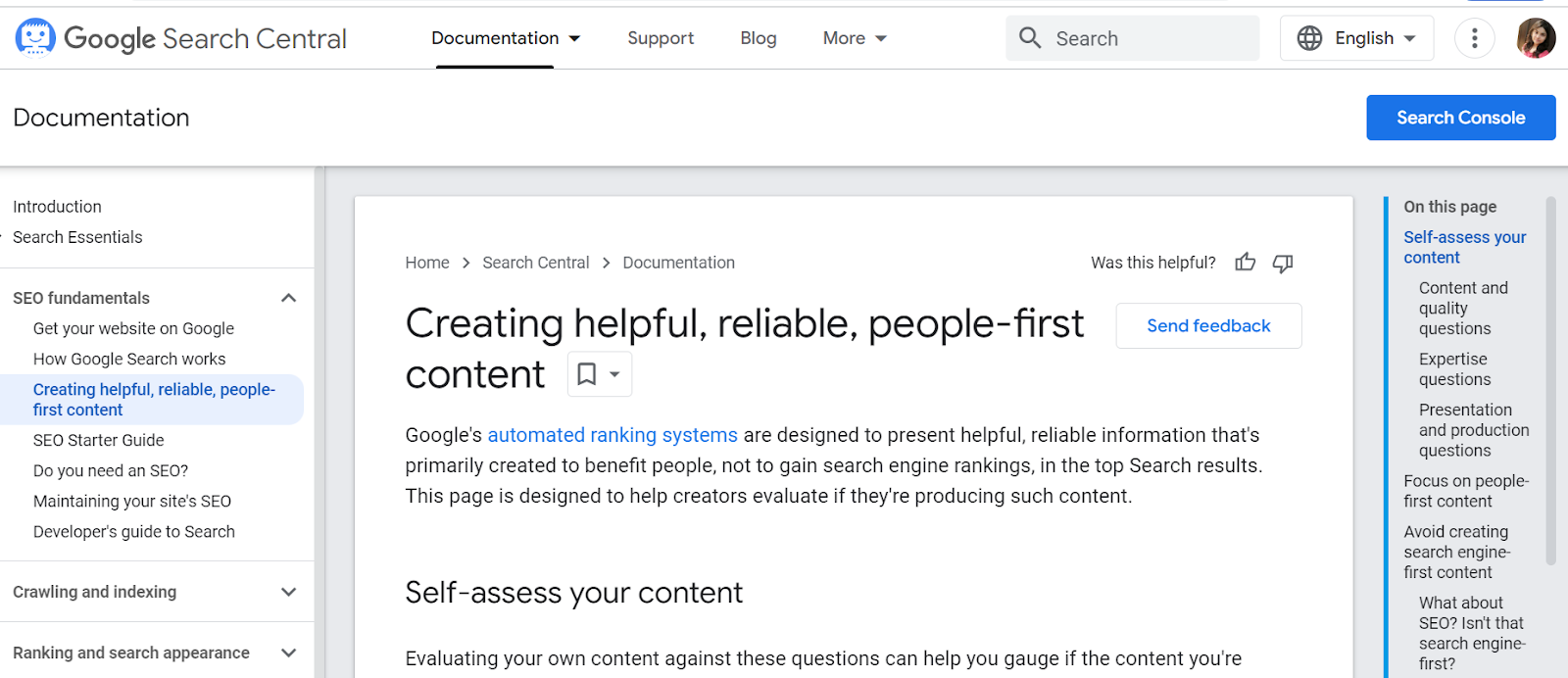
In 2019, webmaster trends analyst Gary Illyes explained to optimize for RankBrain, you simply optimize your content to enhance user experience.

How Much Do Law Firms Spend on SEO?
The cost of your law firm’s SEO varies based on its size, number of practice areas, attorneys, and website pages. Additional factors like the number of offices also play a role.
For instance, it cost $10k per month for Fasig Brook, a personal injury law firm, to get a 152.39% increase in monthly users in 2 years while working with us. This was in super competitive market.

For Stroleny Law, a criminal defense law firm, we were able to achieve a +4175% in monthly leads in 10 months on a budget or $5k per month.
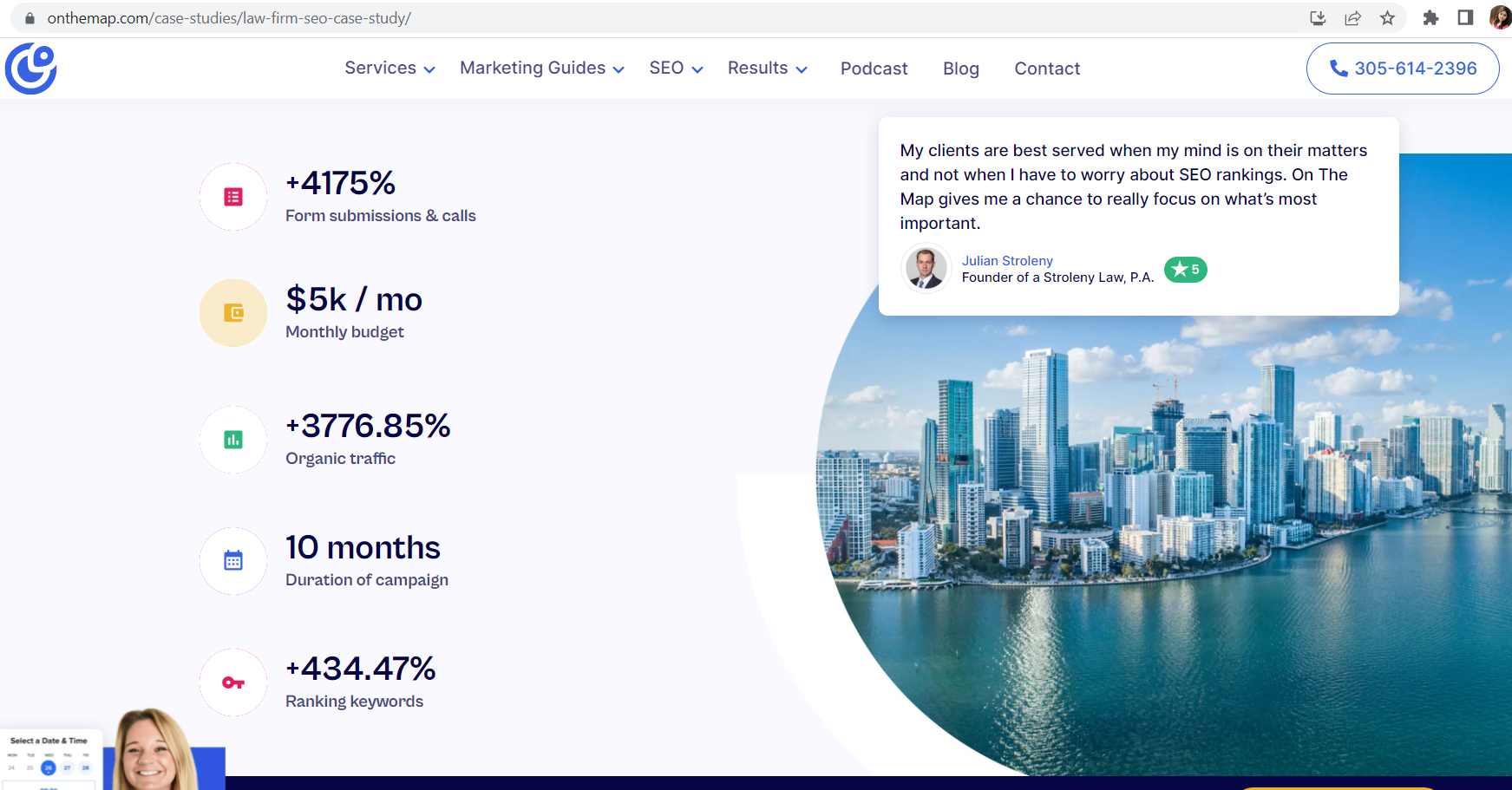
Considering the various factors, you can expect your monthly SEO cost to be in the range of $3000-$15,000.
How Do I Find a Reputable and Reliable Law Firm SEO Agency For My Law Firm?
To find a reputable and reliable law firm SEO agency look for one that specializes in law firm SEO and have a proven track record in delivering results.
Look for testimonials, case studies, and client reviews. When you’re satisfied with what they have to offer, schedule a consultation call to discuss their approach, ask about their experience working with law firms, and assess their transparency and communication.
Plus, don’t forget to check their pricing structure, contract terms, and the level of ongoing support they provide.
What Happens When You Stop Investing in SEO?
When you stop investing in SEO, your website’s visibility in the organic search results and traffic will likely decline and your competitors can start outranking you.
It happens due to several reasons. First, search engine algorithms continuously evolve, and without ongoing SEO efforts, your website may become less optimized and relevant over time. And your competitors who continue investing in SEO can gain an advantage by regularly updating their content, improving user experience, and building quality backlinks.
As a result, their websites may appear more authoritative and relevant to search engines. Plus, they may also be actively targeting keywords that were once your stronghold, it will gradually surpass your rankings.
That’s the reason you need to be consistent with your SEO investment to maintain competitiveness and stay ahead of the competition.
Thrive in the Digital World With The Best SEO Practices
SEO is an ongoing process that requires a consistent investment of time and effort to sustain and enhance your law firm’s website performance in search engine results pages.
Even though a small investment in search engine optimization can provide you with better returns over time, staying updated with the algorithm and constantly regularizing your site with updates may get overwhelming for professionals like you.
The best option here is to let a law firm SEO company take over, so you can entirely focus on providing the best services to the leads it generates.
SEO for Lawyers: (Step-by-Step) Law Firm SEO Guide
-
Ch 1
SEO for Law Firms
Read Article
-
Ch 2
Lawyer SEO Ranking Factors
Read Article
-
Ch 3
Legal Keyword Research
Read Article
-
Ch 4
Link Building for Attorneys
Read Article
-
Ch 5
Legal Content Optimization
Read Article
-
Ch 6
Local SEO for Lawyers
Read Article
-
Ch 7
GMB for Law Firms
Read Article
-
Ch 8
Tracking SEO Results
Read Article
-
Ch 9
Lawyer SEO Stats
Read Article